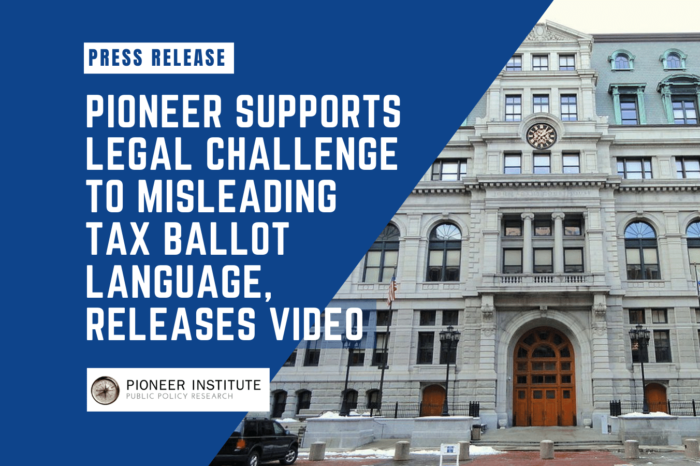Pioneer Supports Legal Challenge to Misleading Tax Ballot Language, Releases Video
Summary language fails to point out that new surtax revenue could just replace cuts, not increase overall education and transportation spending
BOSTON – Pioneer Institute supports the diverse and bipartisan group that filed a complaint with the Massachusetts Supreme Judicial Court (SJC) challenging the summary language meant to provide an accurate description of the tax hike amendment to voters. The language was approved by the Attorney General and Secretary of the Commonwealth when a similar amendment was proposed in 2018, and unless the lawsuit is successful, will likely appear on the Massachusetts ballot in November.
The amendment to the state Constitution would add an additional 4 percent tax on all annual income over $1 million. The proposed summary language put forward by the Attorney General and the Secretary states that the revenue from the tax will be dedicated to fund public education and transportation and, in doing so, neglects to disclose that while receipts from the tax would be directed to those areas, the legislature would be free to redirect current funding for public education and transportation to other priorities. It does not require an additional cent to be spent on our schools, roads, bridges and public transportation.
“Proponents may willfully mislabel this tax, but the AG and the Secretary should not,” said Jim Stergios, executive director of Pioneer Institute. “In 2018, even the Attorney General’s office, which was defending the proposal before the SJC argued that it was ‘just a tax’ – it wouldn’t necessarily increase spending on transportation and education.”
A 2018 effort to bring the amendment before voters ended when the SJC found that the proposed amendment violated a ban on citizen-initiated ballot initiatives that combine unrelated subjects; in this case a new graduated income tax and a directive about where revenue from the tax would be spent. That ban does not apply to constitutional amendments proposed by the legislature, and in 2019 and 2021 the legislature voted to put the tax amendment on the November 2022 ballot.
Pioneer today is also releasing a video from arguments presented during the 2018 oral arguments. In it, the lawyer arguing the Attorney General’s case in support of the tax amendment explicitly agrees, in response to a question from the late SJC Chief Justice Ralph Gants, that the amendment might not result in any overall increase in education and transportation.
Moreover, Attorney General Healey’s own brief from the 2018 case reads, “the Legislature could choose to reduce spending in specified budget categories from other sources and replace it with new surtax revenue.”
Today’s complaint is based on the argument made in the 2021 Pioneer Institute White Paper, “The Graduated Income Tax Amendment – A Shell Game?“ The study was authored by Kevin Martin, the attorney who prepared and filed today’s complaint for the plaintiffs.
“It’s hard to dismiss the possibility of legislators simply using the surtax money to backfill education and transportation cuts when they twice rejected amendments that would have required that the revenue be over and above what’s already been appropriated,” said Pioneer Research Director and former Massachusetts Inspector General Greg Sullivan.
During their debates on the proposed ballot measure, legislators made their intentions crystal clear regarding how new tax revenues will be spent by rejecting two amendments that would have required that the new revenues be invested in addition to existing expenditures. Both amendments were defeated – one by a 154-39 vote, the other by a 156-40 margin.
“As an employer, I’m most concerned about the devastating impact this tax hike would have on businesses and re-investment in growth,” said Cape Cod Lumber CEO Harvey Hurvitz. “But the thing that’s troubling about it is that it’s not even about education and transportation investments.”
Pioneer Institute develops and communicates dynamic ideas that advance prosperity and a vibrant civic life in Massachusetts and beyond. Success for Pioneer is when the citizens of our state and nation prosper and our society thrives because we enjoy world-class options in education, healthcare, transportation and economic opportunity, and when our government is limited, accountable and transparent. Pioneer believes that America is at its best when our citizenry is well-educated, committed to liberty, personal responsibility, and free enterprise, and both willing and able to test their beliefs based on facts and the free exchange of ideas.
Get Updates on Our Economic Opportunity Research
Related Content












